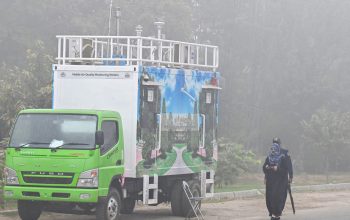ISLAMABAD: Federal Minister for Commerce, Jam Kamal Khan has assured the delegation of All Pakistan Textile Mills Association (Aptma) of the government’s commitment to facilitate textiles and apparel sector to promote value-addition and product/market diversification and boost exports.
In a meeting with the Aptma representatives led by its Chairman, Kamran Arshad, the minister emphasized the importance of textiles and apparel industry vis-a-viz socio-economic development and growth.
The delegation of Aptma included Aamir Fayyaz Sheikh, Chairperson Textile Council (Kohinoor Mills), Anees Khawaja (Mahmood Group), Rahim Nasir (Ayesha Group), Naveed Ahmad (Indus Dyeing), Naveed Gulzar (Crescent Mills), Asad Shafi (Cross Stitch), Ali Ahsan (Ashiana Cotton), Shahid Sattar (Executive Director, APTMA), and Raza Baqir (Secretary General, APTMA North).
Kamran Arshad outlined the critical challenges facing the textiles and apparel sector and their implications, including potential disconnection of gas supplies to industrial captive power plants, high electricity prices, high taxes and liquidity crunch which may erode the industry’s competitiveness and adversely impact exports.
The representatives of Aptma also raised their concerns on withdrawal of sales tax exemption on local procurement for exporters under Export Facilitation Scheme (EFS) of Federal Board of Revenue, introduced in the Finance Act 2024.
They explained that while imports of the same inputs remain tax-free, locally procured materials are now subject to 18% sales tax. Delays in refunding these taxes through the FASTER system have further strained exporters, pushing them toward imports and jeopardizing the domestic supply chain.
Arshad urged the government to renegotiate its commitment with the International Monetary Fund and reconsider the decision of cutting off captive gas supply by end of January 2025 so that sector was able to regain lost ground and enhance exports.
Federal Minister Jam Kamal Khan reaffirmed the government’s support, recognizing the textiles and apparel sector is a cornerstone of Pakistan’s exports and economy.
“The textiles and apparel industry is the established sector, and government will extend maximum support for its sustainability and growth,” he stated.
The minister expressed optimism about increasing textiles and apparel exports through collaborative efforts and supportive policies.
He encouraged a focus on potential in existing markets, exploring new markets and diversifying more to new value-added finished products.
“The Ministry of Commerce is committed to addressing these challenges. I will personally engage with the relevant authorities to find solutions,” the minister assured.
The meeting concluded with a renewed pledge to facilitate and uplift Pakistan’s textiles and apparel industry, a vital driver of exports and employment generation for the masses.
Copyright Business Recorder, 2024
Read the full story at the Business Recorder - Latest News website.



